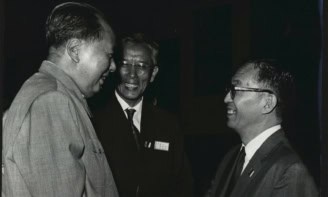
Yoji Totsuka, former director general of the KEK particle-physics lab in Japan, died yesterday at the age of 66. Totsuka, whose research interests were in the field of neutrino physics, served as KEK boss for three years from April 2003 After retiring in 2006, Totsuka became a professor emeritus at KEK and the University of Tokyo.
As KEK boss, Totsuka oversaw the Belle B-factory, in which collisions between electrons and positrons generate copious quantities of B-mesons, which are used to probe the differences between matter and antimatter. He also oversaw the K2K neutrino-oscillation experiment, in which a beam of neutrinos is sent 250km to the vast underground SuperKamiokande detector at the Kamioka Observatory.
Before moving to KEK in October 2002, Totsuka was head of the SuperKamiokande experiment. Under Totsuka’s leadership, the experiment recorded the first ever evidence for neutrinos changing, or “oscillating”, from one type to another, which indicated that these particles had mass. Until then, neutrinos were believed to be massless. Totsuka also oversaw the rebuilding of SuperKamiokande after most of its 11,000 photomultiplier tubes blew up in November 2001.
Born on 6 March 1942, Totsuka received his doctorate in 1972 from the University of Tokyo for research into cosmic-ray muons and then studied electron-positron collisions at the DESY lab in Hamburg, Germany. He joined the Kamiokande experiment — the forerunner of SuperKamiokande — in 1981 and eventually became director of the Institute for Cosmic Ray Research at the University of Tokyo. The institute runs a range of astrophysics experiments, including the neutrino detectors at Kamioka.
During his lifetime, Totsuka received numerous awards including the Order of Culture of Japan and the Bruno Pontecorvo Prize in 2004. Current KEK boss Atsuto Suzuki paid tribute to Totsuka, calling him an “outstanding physicist” and “a prominent leader both in non-accelerator and accelerator neutrino experiments”. Although Suzuki admitted that the pair had had “many discussions and sometimes quarrels”, he praised Totsuka for being “very proactive in pushing foward international cooperation as members of many large particle laboratories”.
Dave Wark from Imperial College London, who is involved in plans to build an upgraded version of the K2K experiment known as T2K, also underlined Totsuka’s importance to neutrino physics, adding that Totsuka could well have won a Nobel prize had he lived longer.
“His tenacity in getting SuperKamiokande built and then rebuilt transformed our field, providing its premier detector and determining its direction,” said Wark. “It is hard to overestimate the importance of SuperKamiokande to neutrino physics. Those of us who are involved with T2K will continue to owe our opportunity to make new world-leading measurements to his legacy. Without Totsuka the world of neutrino physics would be a very different and much less productive place. We have lost one of our best”.



